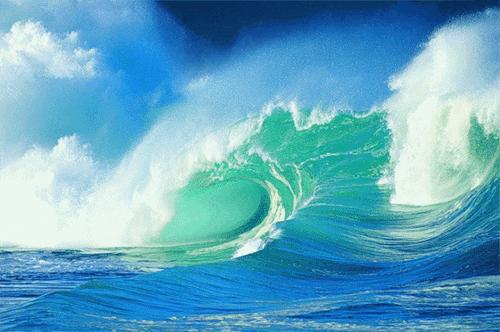
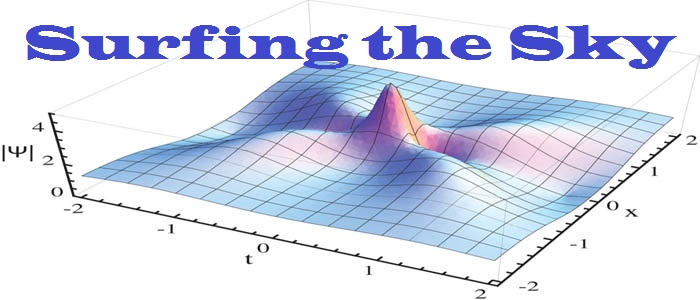
As multiple waveforms meet
they combine, peak, or partially or wholly cancel, depending on their
phase, size, and direction. Know them, ride them. That's what the
physical fundaments of astrology, and surfing -- and indeed life itself
-- are all about.
By John Townley, June 2015
Something we
have been talking about a lot recently is looking at our relationship
with the planets as part of a
matrix of physical wave resonances.
Their cycle rates are on a much larger/slower
scale
than our
daily affairs, but their upper-partial, higher resonant tones are right
at the
speed where we live, and they step down through the medium of the Earth
in
general
and ultimately the specifics of our local environment.
If
there is a consistent physical basis for astrology, this is likely a
major
part of
it.
Yearly, when
we finishing pulling away and reach our maximum
distance from any given planet, we then start to fall more freely
toward it
like the folks in Einstein’s elevator thought experiment.
Then
when we reach
our nearest point our orbital trajectory begins to pull us away again,
stretching against the other planet’s pull. Push, pull, push,
pull in a regular
pulse/wave that is the combination of our own orbital period and a
portion of
the second planet’s. All things equal, that more or less
speeds us
up on
approach and slows us down as we retreat, depending on the size of the
planet
(in the case of Jupiter, actually perturbs our orbit), but to what
extent experts
disagree, as the math of mutual multiplanet gravitational influences is
maddening. Regardless, something akin to a gravity
wave
(not a “gravitational
wave”,
that’s another, still-theoretical animal)
is created in relation to every planet, and however small it may be,
it’s the
only gravitational “noise” going on outside of the
dominant
Sun, so like the
tiny magnetic variations in our brains, it doesn’t take much
to
get noticed. In
fact, stochastic
resonance
may actually
emphasize it. And, in the case of the Moon, it’s really large
and
defined, to
the extent that both Earth and Moon revolve around a separate barycenter
that moves along about 1,000
miles beneath Earth’s surface, the swing point between Earth
and
Moon.
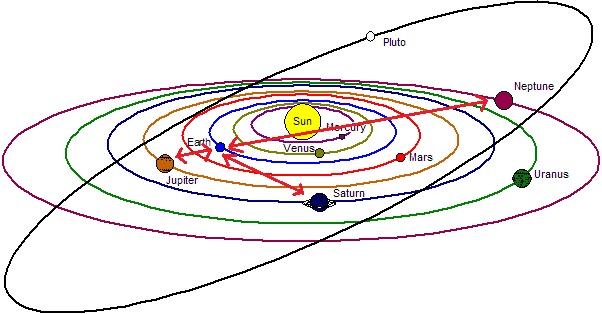
Here
Earth has just "fallen free" toward its closest approach to powerful
Jupiter, and is falling toward Saturn next. After that, the pull of
Uranus and Mars dominate, finally Neptune. Then, all over again,
stretch away, fall back, a continual wave pulse...
Although the
term barycenter
applies officially to one body orbiting another, not the relationships
of
multiple orbiting bodies to each other, still there is a gravitational
swing
point between any two, described by their proximity, which we have
implied in
our Retro
Rhythms
piece. It’s
the dance of the planets, and we all
swing each other as partners, in varying degrees, in the process, with
“barycenters” of gravity somewhere between us in
space. In
fact, such swings (noticed
officially as perturbations) in early, more unstabilized star systems
can throw a whole planet
right out into
interstellar space and perhaps an eternity of wandering the cosmos,
sunless.
When you swing your partner too hard, and lose your grip,
you’re
separated
forever…
Regardless
of the details, it is this set of waves that
gradually change their direction and phase according to where each of
the other
planets are that make up what we call transits in the sky, moving
through the
tropical Zodiac, itself a resonant artifact of Earth’s tilt.
So,
each of the
planets outside our orbit has a somewhat longer-than-our-year cycle
determined
by our mutual orbits, and the ones inside less than a year determined
by the
same relationship. Further, each has a cycle of its own in regard to
our
tropical axis (tropical signs) or the general sky background (sidereal
signs),
depending on your measuring stick, with which our cycle (and our joint
cycles) go
in and out of phase. It’s a phenomenon a little like a Leslie organ
speaker,
as we have pointed out before.
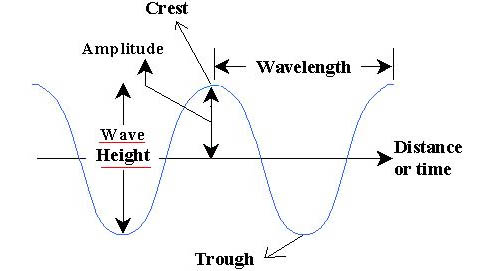
This basic diagram,
describing earthbound gravity waves in water, air, and ground, could
equally apply to planetary cycles, simply by substituting planetary
mass for amplitude, cycle length for wavelength.
Daily, a
similar thing happens on a smaller scale, with any
spot on the surface of our own planet approaching and fleeing each of
the other
planets by the distance of Earth’s diameter a trifle over
once a
day. That’s
the diurnal wave, and it
describes its peaks and troughs when each
planet is at
the MC/IC (peaks) and Asc/Des (troughs), the same as the Moon and Sun
do in
creating
the tides. The same travel that happens through the signs on the larger
scale
here occurs through the houses, as a small subset or upper partial of
the
larger, orbital movement.
And to get
the old skeptics’ chimera
out of the way, none of
this directly applies to an individual, whose weight is too
small and
distant to
get
much gravitational effect. It’s
about the planets’ relation
to Earth, and only subsequently the stepped-down resonances which then
may include individuals locally.
Earth
is locked into the larger scale, the game the big boys and girls play
in orbit
over the eons, and we are locked into the subsystems of those same
rhythms, but
at much higher/faster frequencies. It’s all about entrainment,
just at different scales. Indeed, it may be that the
internal resonances
of Earth itself both generally and locally highly affect and focus,
amplify, or
block these waves and their subsets just as local geography affects
the
timing, height, and impact of the tides. Individually, we are at the
tail end
of these processes, not in a direct planet-to-individual relationship
at all.
However, the pattern of the point we step into them (the natal
horoscope) stays
with us as our immanent initial
conditions, further molded and cemented
by
subsequent repeating cycles.
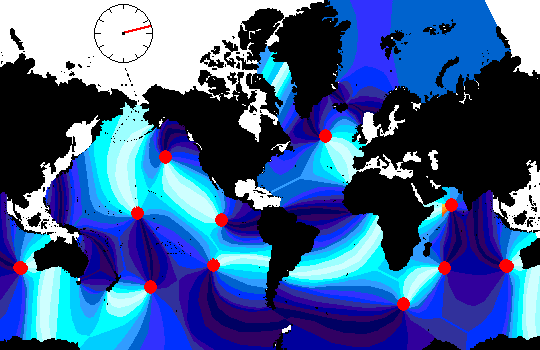
Ocean tides rise and fall
with the Moon around the globe, but they also cancel out entirely in
nearly a dozen places called nodes (in red). This environmental
molding principle could hold implications for diurnal cycles of the
houses and locational astrology.
By looking
at all planetary cycles as gravitational
pressure/proximity waves that combine, cancel, and interact in a
similar
fashion to waves at other scales and spectra, it may be possible to use
our
knowledge of these other types of waves to increase our reliable
knowledge and
use of astrology. Where we once had simply seat-of-the-pants evidence
from
astrologers’ personal experience combined with abstract,
often
esoteric
numbers-based theory, we may find we have the physical causes
themselves at our
fingertips in a manageable, measureable, and more predictable form. In
known
interactions such as interference
patterns/nodes
and their borders, standing waves, addition, suppression or
cancellation,
and overtone series, we may
find
rules that are not only similar to those in astrology, but are in fact
the
reason for those astrological tenets arising to begin with, being their
actual
physical cause.
Further, in
this light, wave theory is useful because it opens up sets of metaphors
from which to deduce possible meaning based other scales where the
mechanics are known and can be compared. Suddenly
we see
our familiar life images of wind and wave, tides and weather, musical
rhythms
and visual patterns bringing greater clarity to our astrology, because
they all
mutually rely on the same principles,
proportions, and motivating
forces. And
we begin to see astrology itself as another natural, environmental set
of
phenomena within which we live and of which we are an integral part.
The mutual comparison of multiple
scales is really important to understand our place in all this.
That's because we see some from the outside-in (where we are the larger
entity, as in light and sound scales, smaller and faster than us) but
others from the inside-out (where we are smaller and faster than the
waves and riding them, like the ocean, weather, or the planets).
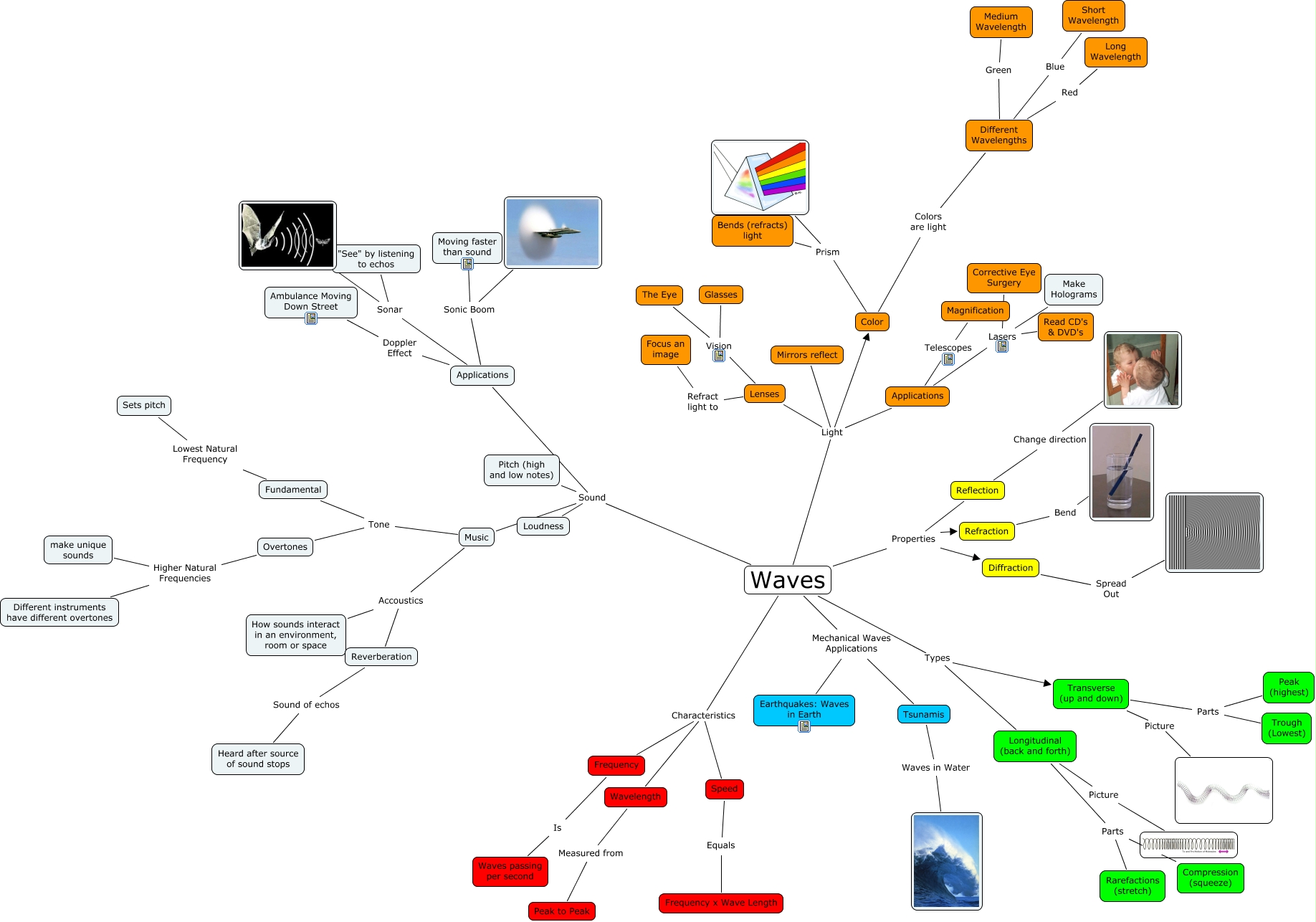
We
are surrounded by, and indeed constructed of, waves -- mechanical,
electromagnetic, gravitational, biological, social, informational --
but the mainly
gravitational (and in some cases electromagnetic) wavecycles of the
planets proceed at a slower, more entrainingly ineluctable pace than
all the rest. Right-click on picture above for a formidable taste.
As we
continue to pursue this direction, it will become
ever more evident how useful this can be in explaining both why and
where astrology does
work, and also where it may be less
visibly working when it seems not
to
be working. Three quick examples:
1. One
wonders why more momentous things
don’t happen at
exactly the peak point of a terrible transiting grand cross, for
instance.
Well, that can be a still point of wave cancellation, so it
shouldn’t produce
much, although all hell should be breaking loose on either side of it,
which
does tend to be the case, subject to other general principles of aspect formation.
It’s
a tempting explanation for why the various, much-touted
“harmonic
convergences”
and the like don’t seem to produce much.
2. When a series of lunations
gets lined up with major
points in a natal chart, the individual gets the expected
crest-of-the-wave
kicks one might expect, but the rest of the month, even with motivating
aspects, may prove mysteriously uneventful or even in disarray –
something
one
would expect
from being in the trough of a major wave that dwarfs and overrides
usually
more-noticeable transits.
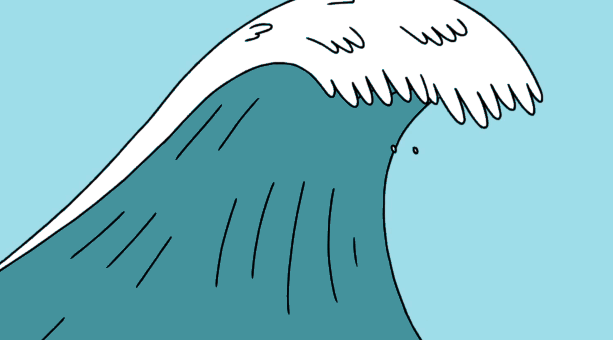
A
more rarely-occurring giant planetary wave (as generated by an eclipse,
or other large planetary resonance) may dwarf others around it,
separating sets of events and even birth generations. In
surfing/sailing, it's the legendary "seventh wave"...
3. In the
larger life picture, the widespread belief that
eclipses are very important (both in mundane and personal effects) and
that
the prenatal solar eclipse
marks a six-month swath of somehow-related
individuals,
it would be well to look at them as unique waves. Although lunations
are themselves
wave peaks of the solunar cycle, eclipses are the especially stronger
ones.
In vernacular parlance, they are literally the extra-strong “seventh wave”
that
sailors and surfers speak of, and they set apart six months of
lunations like a
set of brackets. One is born into a family of contained sub-waves,
bracketed by
the prenatal and postnatal solar eclipses, and when born on or near an
eclipse (esp.
just
before), one straddles two families (with demarcation by progression of
or to
the natal or eclipse charts). The use of the concepts of
“karma”
and fated connections often attributed to the
eclipse-formatting
lunar nodes may suggest that there is a larger-scale group selection
involved,
wherein the natal chart may show how and where the individual is
synced-up with
the group (the eclipse chart), by degree areas contacted (and thus the
planetary note/phases being reinforced).
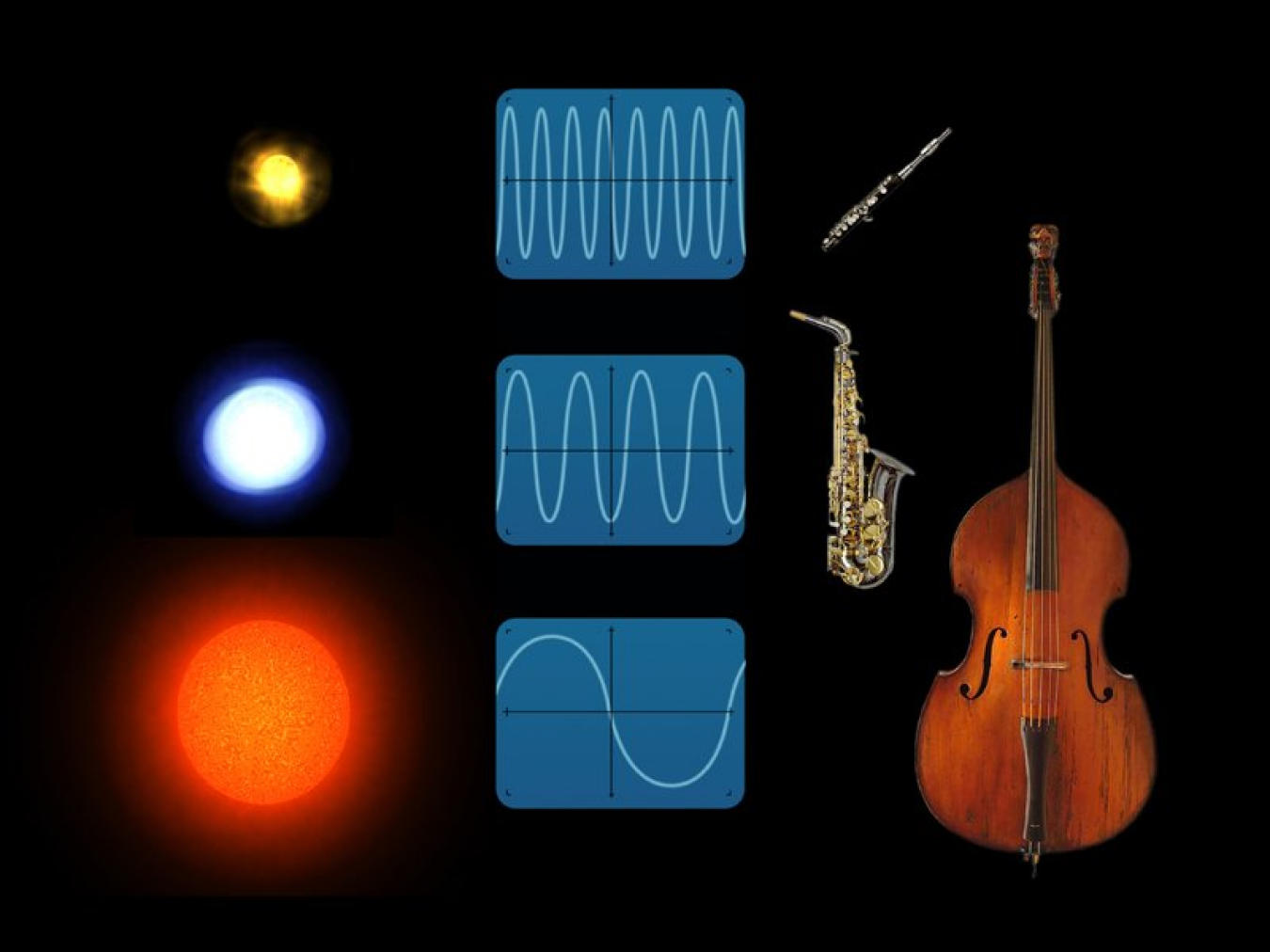
To
quote the old Sesame Street
song, "That's about the size,
where you put your eyes,
that's about the size of it!" Or maybe your ears...
These
are just a few of the places
that using the waveform analogy/identity
in astrology can lead you. Whether it's the intimate
vibrations of a chamber ensemble or the huge, Earth-moving rhythms of
the Sun and planets themselves, it's all a matter of relative scale and
interaction, as we surf the
overtone series of our resonant
environment. The relationships and qualities of the planets and signs
have evolved accordingly, and although we have been clever enough to
notice and classify the surface patterns of some of that in our
traditional textbooks, we have so far lacked the fundamental theory to
consistently probe its depths and causes. That will likely be the
task of
another generation of astrologers and environmental scientists who
become more willing to speak each others' languages. But there's no
time like the present to start mapping out some of that unexplored
territory, and marking it for further investigation...

Your
natal chart's initial
configuration, held skillfully in balance with the developing waves
around you, tells your whole story...
Not
a
newsletter subscriber already? Subscribe
Free
Here!
And
every day, keep in touch with our Astrology In The News section...please
take a look! --
Breaking news from
around the globe, plus articles, reviews, it's all happening there,
changes daily..
|
|
|

